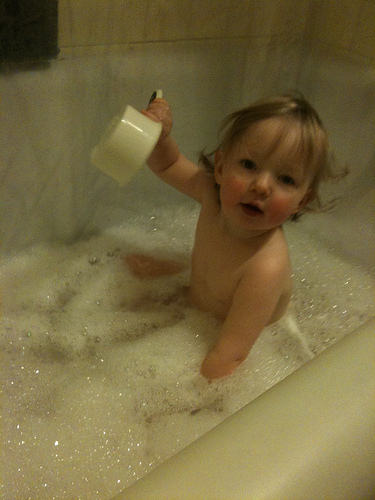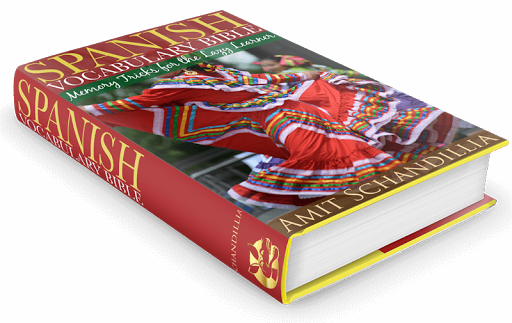Mexicans don’t duchar
 |
| Me voy a bañar en la ducha Photo credit: Suedehead licensed CC BY-SA 2.0 |
Now back to Mexico. Here, people use bañarse for the action regardless of whether it’s performed under a shower or in a hot-tub! So, me voy a bañar or voy a bañarme would mean both “I am going to take bath”, as well as “I’m going to take shower”. No need to use ducharse at all! So, now we know better that while in Mexico, you just use bañarse at all times. Also, it is worth mentioning here that you won’t go completely misunderstood if you do end up using ducharse in Mexico albeit it will surely give away your non-Mexican background.
So how do you tell the difference?
That pretty much simplifies everything. One word for both taking shower and taking bath means one fewer word to cram. But if you are like me, you will ask the million-dollar question: How to tell if one is actually taking shower under, well, a shower and not soaking in the bath? Turns out, there’s a simple, three-word solution, en la tina. This phrase when added to the verb, bañar, becomes bañarse en la tina and lends the effect of “bathing in the bath” to the sentence. So, if you want to say that you are going to bath specifically as against taking a shower, you’d simply say, voy a bañarme en la tina or me voy a bañar en la tina or me voy a tomar un baño de tina. The latter literally translates into “taking a bath in the bathtub”.
 |
| Me voy a bañar en la tina Photo credit: Liza licensed CC BY-SA 2.0 |
So, by now you must have understood that la tina refers to “the bathtub” (also called la bañera) and la ducha, “the shower.” Again, only if life were that simple! You will often hear Mexicans using multiple words for everything including their bathtub which could also be referred to as la bañera or even la bañadera. Don’t worry, however, you will not be crucified if you do end up using ducharse for “taking a shower” as it is standard Spanish and educated speakers round the world understand standard Spanish quite well. You won’t sound, er, Mexican though. Please note that this usage of bañarse for both bathing and taking shower could also exist in some other parts of Latin America, especially places that experience degrees of Mexican influence. In Spain, however, ducharse is the norm for what it means.
Further trivia
At this stage, it is important to add that while ducharse is alien to Mexican ears, it is also unheard of in many other Latin American countries, the Southern Cone in particular, i.e., Argentina, Peru, Chile, etc. On the other hand, in Spain, bañarse is used for bathing in any water body and not just a bathtub. So, you use bañarse when bathing in a river, beach, or even pool. Darse un regaderazo is what they say in El Salvador when talking about taking a shower. However, the same phrase would take on an entirely different meaning if you were in the Southern Cone. For example, in countries like Chile and Argentina, you would use the phrase when you talk about watering the plants.
Remember that, depending on the community you find yourself in, you could be either taking a bath (tomar un baño) or giving yourself a bath (darse un baño). Of course, the phrases become tomar una ducha and darse una ducha when an actual shower is being referred to. This is yet another variety that you could encounter if traveling to a Spanish-speaking country.
If these tidbits of street Spanish intrigue you and rake up your curiosity, feel happy for this is an indication that your mind is actively absorbing Spanish on its own without any use of force on your part! Learning Spanish can never be an act of reluctant force. You have to savor its rhythm, its diversity, its sound, and its rich vocabulary in order to ensure maximum absorption and minimum efforts.



.png)
Super cool! All these words for a simple "baño." I made an Info graphic with the bathroom vocabulary in Spanish for different countries here: http://www.speakinglatino.com/speaking-latino-whats-the-word-bathroom/
ReplyDeleteGlad to have you here, Diana :)
ReplyDeleteWell, yes this post focuses solely on the words for taking shower or bath. It doesn't discuss any other aspects of the bathroom. Actually, I was looking forward to doing a "Street Spanish" article on what different bathroom fixtures are called in different countries across the Spanish-speaking world but your seem to have taken the cake. ;)
By the way, I just checked your post and that's a cool infographic you've got out there. As they say, a picture is worth a thousand words and your infographic does a brilliant job summarizing what would have taken pages of discussions. Thanks for sharing your work! :)